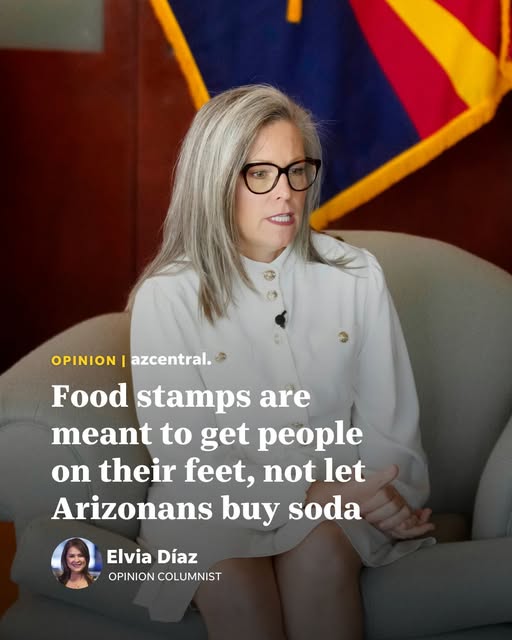
Opinion: “Arizona Democratic Gov. Katie Hobbs blew up a chance to restrict the purchase of soda on food stamps. And worse? She has no good reason.”
In early 2023, Arizona’s Democratic Governor Katie Hobbs faced a decision with the potential to address one of the most significant public health challenges in the United States: the ever-increasing rates of obesity, diabetes, and other health issues tied to poor dietary habits, particularly the consumption of sugary drinks. The Arizona Legislature passed a measure that would have restricted the purchase of soda and other sugary drinks through the Supplemental Nutrition Assistance Program (SNAP), more commonly known as food stamps. However, Governor Hobbs vetoed the bill, effectively shutting down what could have been a step forward in combating the state’s growing health crisis. By doing so, she missed an opportunity to make a meaningful difference in the lives of vulnerable Arizonans while simultaneously neglecting her duty to lead in public health policy.
At its core, Hobbs’ veto was not just a missed opportunity but an abdication of leadership on an issue that directly affects millions of low-income families. In a state where nearly 20% of adults are considered obese, and where the rate of diabetes has skyrocketed, the idea of limiting the purchase of unhealthy, sugar-laden drinks on food assistance programs was a small but potentially significant measure in the fight against poor health outcomes. But Hobbs chose to take the politically expedient route and dismiss this potential solution, seemingly without offering a robust, rational justification for her decision.
Before diving into the reasons behind Hobbs’ veto, it’s important to understand the rationale behind the proposed restriction. Critics of sugary drinks have long argued that soda is one of the most significant contributors to the obesity epidemic. In particular, sugary drinks like soda have been found to contribute to a myriad of health problems, including obesity, type 2 diabetes, heart disease, and even certain forms of cancer. Studies have consistently shown that regular consumption of sugary drinks leads to weight gain and poor nutrition, while providing little to no nutritional value.
One of the most compelling arguments for restricting soda purchases on food stamps is the fact that low-income communities tend to experience the worst health outcomes. Food insecurity and poor diet are directly correlated, and people who rely on public assistance often face the most significant challenges when it comes to accessing nutritious foods. As such, one could argue that public programs like SNAP should not be subsidizing the purchase of unhealthy foods and drinks that contribute to long-term health problems, particularly when these problems burden the public health system and taxpayers.
Furthermore, the argument for restricting soda on food stamps is not merely about health; it is also about fostering personal responsibility. It is crucial to recognize that individuals, particularly those receiving food assistance, should not be left to make decisions that have long-term consequences for their well-being without being provided with adequate guidance and resources. When food stamps subsidize the purchase of unhealthy foods, they inadvertently promote poor choices that can perpetuate cycles of poverty and poor health. By restricting the purchase of soda and other sugary drinks, public assistance could play a role in nudging beneficiaries toward healthier, more sustainable food options.
Additionally, there is ample precedent for such restrictions in other states. New York, for instance, has implemented similar bans on the purchase of sugary drinks through food assistance programs, and other states, including Michigan and California, have debated similar measures. These programs, while not without controversy, have been presented as sensible public health interventions that can help combat the effects of the growing obesity crisis.
In light of this compelling case for restricting soda purchases on food stamps, Governor Hobbs’ veto represents not just a failure of policy, but a missed opportunity to be a leader in the fight against obesity and poor health in Arizona. Hobbs’ decision to reject the bill was especially disappointing considering that, as a Democratic governor, she has the chance to align herself with the values of progressive public health policy, which typically includes efforts to reduce the social determinants of poor health.
Governor Hobbs argued in her veto statement that restricting the purchase of soda with food stamps was an infringement on personal freedom and that individuals should be trusted to make their own dietary choices. While this may sound reasonable on the surface, it overlooks several key realities that govern public assistance programs. First, personal freedom cannot be considered in a vacuum when public funds are being used. When taxpayers are funding a program like SNAP, they have every right to expect that those funds are being used in ways that contribute to the overall well-being of recipients. Allowing the purchase of sugary drinks with food stamps ultimately results in taxpayers subsidizing health problems that disproportionately affect the poor, driving up healthcare costs for everyone.
Moreover, Hobbs’ veto seemed to ignore the overwhelming body of research that underscores the negative health impacts of sugary drinks. Personal freedom cannot be a blanket defense when the long-term costs of poor health are borne by the public at large, especially when the state has a moral obligation to improve public health. The reality is that while personal responsibility is important, we are all interconnected. When one segment of the population suffers from preventable diseases caused by poor dietary choices, it puts an enormous strain on the healthcare system, ultimately affecting everyone in the community.
Hobbs also suggested that such a restriction would disproportionately affect low-income communities, who rely on food stamps the most. This is a point that deserves some consideration. However, it’s crucial to note that the intention behind the restriction was not to punish low-income individuals but to encourage healthier choices. While it is true that such restrictions might pose a challenge for some individuals, it could also be seen as an opportunity to shift the conversation about food assistance away from simply meeting caloric needs toward promoting a better quality of nutrition and fostering long-term health. Instead of solely focusing on “freedom of choice,” the conversation should focus on how public policy can create an environment where healthier options are more accessible and attractive, even to those who rely on assistance.
Perhaps the most frustrating aspect of Hobbs’ veto is that she did not offer any meaningful alternative solutions for addressing the public health issues tied to sugary drink consumption. There is no indication that Hobbs has proposed or plans to propose other, more effective measures to curb the consumption of sugary drinks in low-income communities. Instead of using her veto as a stepping stone for promoting better nutrition, she chose to maintain the status quo, allowing soda to remain an acceptable purchase on food stamps without any policy shift or effort to tackle the root causes of the obesity crisis.
By vetoing the bill, Hobbs also failed to take advantage of the opportunity to engage in a more nuanced conversation about food policy and public health. Restricting soda purchases could have been just one component of a larger initiative aimed at improving food choices for low-income Arizonans. Such an initiative could include expanding access to fresh produce, supporting local farmers markets, and offering education on nutrition. A multifaceted approach would not only address immediate concerns but also work toward breaking the cycle of poor diet and chronic health conditions over the long term.
There is, of course, a political calculation at play here as well. Governor Hobbs’ veto aligns with a broader Democratic strategy that prioritizes individual rights and freedoms, particularly when it comes to the issue of government intervention in personal choices. The veto may have been an attempt to avoid alienating voters who are sensitive to government overreach. It is also worth noting that soda manufacturers and the beverage industry are powerful political lobbies that could have weighed in against the proposed restriction, potentially influencing Hobbs’ decision.
Nevertheless, the political calculus behind Hobbs’ veto cannot fully justify her decision. While political considerations are an inherent part of any governor’s decision-making process, they should never come at the expense of public health, particularly when it comes to an issue as pressing as the obesity and diabetes crisis. By vetoing the bill, Hobbs chose to side with short-term political concerns instead of standing up for the long-term health of her constituents.
Governor Katie Hobbs’ veto of the bill that would have restricted the purchase of soda through food stamps was a missed opportunity to make a meaningful impact on public health in Arizona. By rejecting the bill, she not only failed to address a significant contributor to the state’s obesity and diabetes crisis but also ignored the broader issue of how public assistance programs can be leveraged to promote healthier lifestyles and prevent costly, preventable diseases. The veto raises important questions about the role of government in shaping public health policy, and in this case, Hobbs’ decision revealed a troubling lack of leadership on an issue that directly affects the well-being of millions of Arizonans. For those concerned about the future of public health in Arizona, this veto represents a setback that could have long-lasting consequences for the state’s health outcomes.





